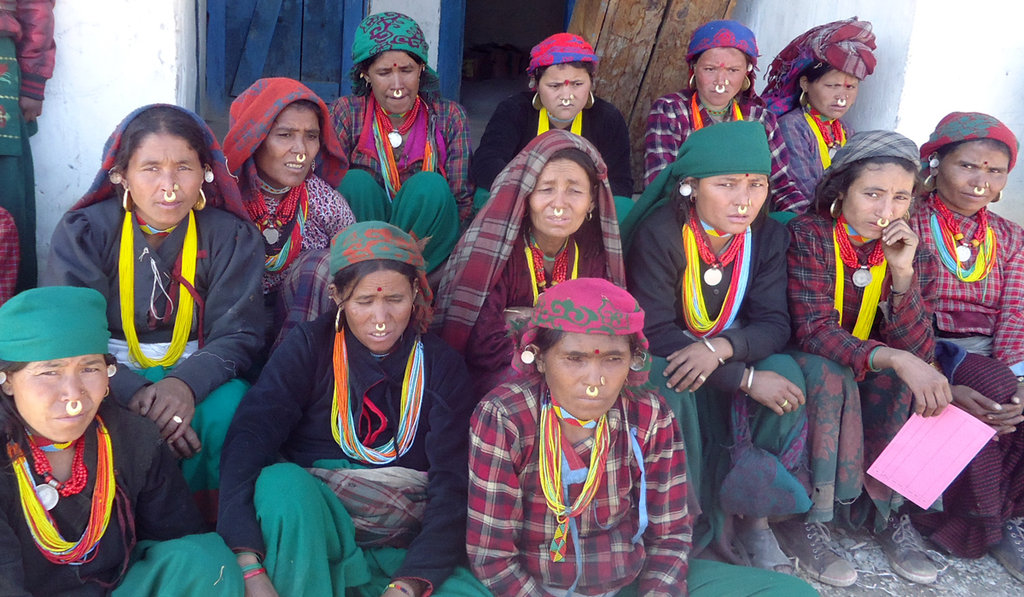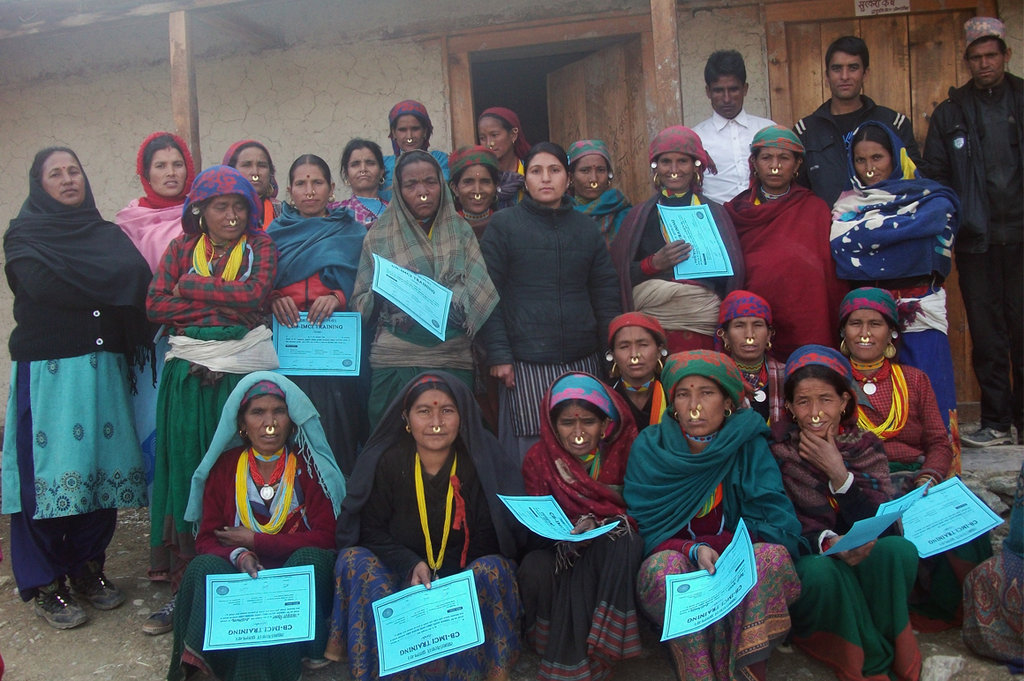By PHASE Nepal | PHASE Team
Namaste Friends! Winter has nearly left us; however it is still very, very cold in most of the PHASE field posts around Humla and Gorkha regions. Despite winter, our staff have been working consistently for the last two months in the snowy regions. It is all possible because of your generous support.
Early pregnancy is one of the major causes in maternal deaths in rural areas of Nepal. Social factors such as culture, traditional practice and social status influence early age marriage in much of society, which leads to early marriage and then early pregnancy. To highlight this, let us share a story about teenage/early pregnancy in Maila village. Friends! Meet Rupshila Sarki of Maila village. Rupshila Sarki is a 17 years old girl married to Chandra Bahadur Sarki for the last two years.
Rupshila recalls – “When I was 15, my parents arranged my marriage to a 19 year old boy, Chandra Bahadur Sarki. We lived happily until a year passed but after this time, my in-laws started to look at me strangely. I did not care for a month or two about their weird behaviour but then they started to discuss pregnancy. I came to understand the reason why they looked at me strangely - They wanted me to have a baby soon!”
At first, Rupshila did not overly worry about her in-laws’ demand, thinking that every in-laws wants and deserves grandchildren. Chandra also did not listen to his parents. But Rupshila became stressed when she went to her parental home.
She says – “When I went to my parental home, both of my parents insisted that if I did not become pregnant within a month or two they will not allow me to visit my parental home again. They kept reminding me of the importance of having a baby. They also reminded if I do not become pregnant soon then society will cast doubt upon me; including my relatives.”
In this area, it is believed that if a married couple do not have baby within a year or two then it is because they did something wrong in a previous life. On the other hand, having a baby is seen as a symbol of prestige and status. Rupshila’s parents and in-laws did not want their family status to suffer.
Rupshila continues – “I was not able to think clearly. I did not want to become pregnant that soon. I used to sit in the community health education sessions run by PHASE staff in the village and came to know that early pregnancy is harmful to both me and the baby. But on the other hand, I could not bear the force from both my parents and my in-laws. I talked with my husband and decided go to the health post for counselling the very next day. I went to health post and met two PHASE sisters in the post. They took me inside the separate room when my turn came. I told them everything about my family problems.”
Rupshila had chosen the right place to go at the right time! PHASE staff gave her some advice about the risks and realities of early pregnancy and asked her to come again as soon as possible with her husband. When she was on the way to home she met some village women carrying fodder from the jungle. They asked her whereabouts and she explained, giving them the details. Rupshila found out from talking to her friends that there was also a rumour in the village that Chandra – Rupshila’s husband- has a problem with his reproductive system, which was preventing Rupshila from becoming pregnant.
Rupshila struggled to say – “When I heard about my husband’s problem from friends I felt like I was buried down in the earth; however after a while I also felt quite comfortable because there is no problem with me, it is all because of my husband. I planned to tell the facts to all my parents and in-laws and they will start to blame on my husband instead of me. I reached home and told my husband that PHASE sisters want to meet both of us together at the health post. I did not mention the rumours about his problem. The very next day, we went together to the health post. PHASE sisters took us inside the separate room and asked us about our education, family background and marriage date etc. They started to advise us about the risks of early pregnancy. They said best time to become pregnant is between 20 to 35 years of age. Whilst we are still young, the reproductive organs in our body are still developing, so it may cause vaginal bleeding and abdominal cramps which lead to miscarriage, placental abruption and placenta previa, premature birth and ectopic pregnancy as well. They also informed us that early pregnancy may lead to swelling and pregnancy induced hypertension. I felt scared and worried after hearing all their advice, and promised not to become pregnant before 20 years of age; my husband was also committed to do so. After a long counselling session, PHASE sisters advised us to bring our parents if they continued to insist on my becoming pregnant. I was happy but nervous on other hand. My parents and in-laws never stop insisting about us having a baby.”
Rupshila was happy but nervous. She was scared about the reaction from her parents and in-laws. On the way to home, she discussed with her husband and decided to take both their parents to the health post to clarify the reasons why she does not want to have a baby sooner.
“At first, my parents did not agree to come to the health post since they live in 4 hours walk away. Also, they were upset with us because of taking advice from health staff. They were upset and said that we ruined their social status by going to health post to stop pregnancy. They also said- they were only 19 when they had their first baby, and have had 6 children without any problem. They also said this is a natural gift; we have to accept it as soon as possible without delay.” Rupshila further adds – “I ignored their reproach and said calmly that PHASE sisters are good and they will give us the way to become pregnant in healthier way as soon as possible. After refusing for a while, they agreed to go the health post thinking that they will become grandparents soon. We six including parents and in-laws went to the health post after a week. PHASE sisters were in their usual duty. After half an hour, they called us inside. We all entered into the separate room. PHASE sisters greeted all of us and started the conversation from wellbeing and usual daily lifestyles. After a while they repeated the same counselling again with my parents and in-laws. They queried that if anything happens to me who will be responsible? If I am not in perfect health then how can I give birth to a healthy baby? They incorporated several examples of risk and dangers in early pregnancy and convinced our parents that it would be safer to have a baby after three years. After the counselling both parents were happy and promised not to force me until three years. We thanked sisters for their help and support. We returned happily to our home.”
PHASE staff organizes community health education session, door-to-door home visits, clinic health education session and school health education session every three days in a week. Rupshila attended the events and kept in mind that early pregnancy is dangerous. This helped her to avoid the possibility of early pregnancy.
Thank you very much for your generous support!!!
Please help us continue our work in Maila so that women and children can get the health service they need.
Links:
Project reports on GlobalGiving are posted directly to globalgiving.org by Project Leaders as they are completed, generally every 3-4 months. To protect the integrity of these documents, GlobalGiving does not alter them; therefore you may find some language or formatting issues.
If you donate to this project or have donated to this project, you can recieve an email when this project posts a report. You can also subscribe for reports without donating.
Support this important cause by creating a personalized fundraising page.
Start a Fundraiser
